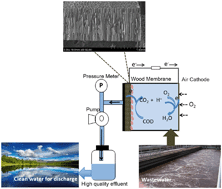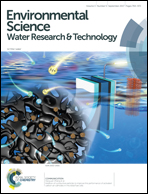A conductive wood membrane anode improves effluent quality of microbial fuel cells
Abstract
Microbial fuel cell (MFC) technology demonstrates good potential for recovering energy from wastewater, but it has been insufficient to act as a stand-alone treatment solution because its poor effluent quality cannot meet discharge standards. This study presents a new wood-based membrane anode for MFCs, which greatly improved the removal efficiencies for chemical oxygen demand (95–97%), total nitrogen (85–91%), and total phosphorus (89–93%) from wastewater compared with a traditional carbon cloth anode. The effluent quality from the wood-anode MFC was in compliance with wastewater effluent discharge standards. Similar power outputs were obtained from MFCs equipped with different anodes (248–295 mW m−2), and no significant fouling was observed on the membrane anode. The long and well-aligned channels in the wood anode have high surface area, which allows cell acclimation without blocking water flow. The wood filtration anode enables MFCs to become a stand-alone technology for energy-efficient wastewater treatment.



 Please wait while we load your content...
Please wait while we load your content...